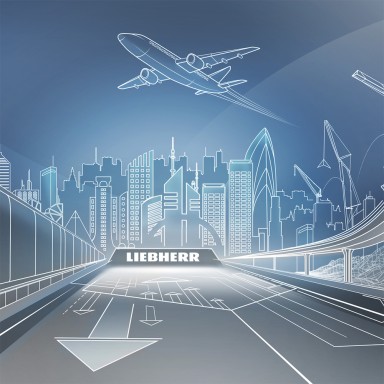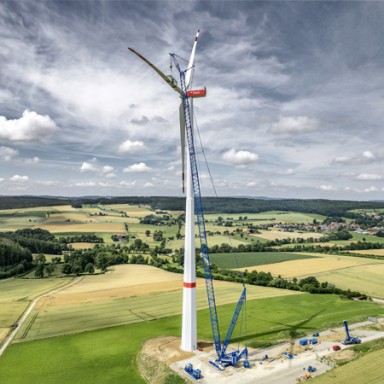Latest news
News and press releases
01/15/2026Press releases
At a gravel plant in Munich, a Liebherr large wheel loader is loading trucks from MAN and Daimler Truck. What appears to be a routine operation is actually a milestone: all three machines are powered by hydrogen engines, operating largely CO2-free and setting new standards for sustainable construction site logistics. The operation offers a glimpse into the future and proves that low-emission construction sites are already possible today.
Find out more01/15/2026News
Packaging optimisation for sea freight
Liebherr-Logistics GmbH optimizes the packaging of sea freight shipments, conserving valuable resources and reducing packaging costs by half.
Find out more01/15/2026Press releases
Where engineering meets architecture: Liebherr cranes build the KJ Plein development in Den Haag
A new urban quarter is taking shape at KJ Plein in the centre of Den Haag. Since late 2023, two Liebherr 550 EC-H 20 Litronic cranes have been in operation on site. These high-top tower cranes deliver high lifting capacities, precise control and efficient workflows in limited space, making an essential contribution to scheduled progress ahead of the planned completion in spring 2026.
Find out more01/14/2026Press releases
Liebherr LTM 1230-5.1 joins PT Pupuk Kalimantan Timur’s fleet in Indonesia
The LTM 1230-5.1 from Liebherr is the only mobile crane on the market that meets the requirements of the Indonesian company PT Pupuk Kalimantan Timur. The 5-axle crane is ideal for working in steep positions and at high hook heights and will be used in fertiliser production.
Find out more01/14/2026Press releases
Liebherr introduces the T48-8s telescopic handler: more reach, more height, more versatility
Liebherr expands its successful range of telescopic handlers with the launch of the new Liebherr T48-8s. The model combines the proven performance and comfort of the T55-7s with an extended working range, offering a maximum lift height of 8 metres and a maximum load capacity of 4.8 tonnes. Sales will officially commence at Bauma 2025, with deliveries already underway.
Find out more
Magazines by Liebherr
Exhibitions and events
01/20/2026 - 01/22/2026Exhibitions
www.worldofconcrete.com/en/attendee.html02/10/2026 - 02/12/2026Exhibitions
www.uzbuild.uz/en03/18/2026 - 03/19/2026Exhibitions
www.solids-dortmund.de04/17/2026Exhibitions
www.future4you-bc.de/365t04/24/2026 - 04/25/2026Exhibitions
scotplant.com
Continue reading

Our year in figures
Published every year, our Annual Report looks back in detail at the past financial year. Find out facts, figures and stories from the Group.

Shaping digital transformation
Whether it is IoT, machine learning or cloud applications – discover Liebherr’s wide range of digital solutions.

All about wind energy
As a strong partner to the wind industry, Liebherr offers the right solution for a wide range of requirements.

Social Media
Find your community among Liebherr's many social media channels.